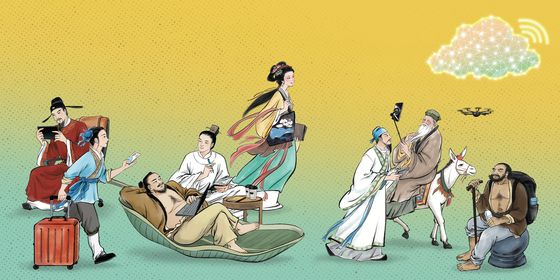Feline phrases throughout Chinese history
Choice Chengyu is a regular column, examining interesting, unique or newsworthy examples of chengyu—four-character idioms or proverbs, derived from historical and mythical events.
October 29 was Cat Day, a special occasion for fans of felines, and anyone else who looks at memes on the internet.
While the cat isn’t one of the 12 animals in the Chinese zodiac, the animal had many admirers throughout history. In literature, cats have been depicted as bringing good fortune, and even ruling a planet of their own, while today’s catless millennials satisfy their kitty cravings with virtual cats.
There are also many chengyu employing the character for “cat,” 猫 (māo), or 狸 (lí) in ancient times, though not all are positive. Many refer to the cat and the rat as a pair, based on the traditional enmity between the two animals.
猫哭老鼠 Cat grieving over the rat
This terms is similar to “shedding crocodile tears,” refering to a hypocritical show of sorrow or sympathy.
Don’t shed your tears like a cat weeping over a dead rat. You must be very happy that he was fired.
Bié zài zhèlǐ māo kū lǎoshǔ le. Tā Bèi kāichú le nǐqíshí gāoxìng de hěn ba.
别在这里猫哭老鼠了。他被开除了你其实高兴得很吧。
猫鼠同眠 The cat and the rat sleep together
Originating from the New History of the Tang Dynasty, this term was used as a metaphor for officials who turn a blind eye to the wrongdoings of their subordinates. Now it describes acts of collusion:
These corrupt officials shield one another just like cats and rats sleep together. No one care about the life of ordinary people.
Zhè xiē tānguān hàngxiè yíqì, māo shǔ tóngmián, méirén zàihu lǎobǎixìng de sǐhuó.
这些贪官沆瀣一气,猫鼠同眠, 没人在乎老百姓的死活。
穷鼠啮狸 A desperate rat will bite the cat
As a Chinese saying goes, even a desperate rabbit will attack, and so will cornered rats fight back against their natural predator. This chengyu warns us that even the gentlest or most timid individuals shouldn’t be pushed too far:
A desperate rate will bite the cat, and a cornered dog will leap over the wall. Don’t push him too far, or he may fight back.
Qióng shǔ niè lí, gǒují tiàoqiáng. Bié bǎ tā bī de tài hěn le, yàoburán tā huì fǎnjī de.
穷鼠啮狸,狗急跳墙。别把他逼得太狠了,要不然他会反击的。
以狸致鼠 Use a cat to attract a rat
In order to achieve your goals, it’s important to employ right strategy for the situation. This chengyu originated from Lǚ’s Commentaries of History, a book written in the 3rd century BCE, and describes an illogical solution that will surely fail:
Your idea is just like using a cat to attract a rat. How could it work?
Nǐ de zhúyi wánquán shì yǐ lí zhì shǔ, zěnme hùi yǒuyòng ne?
你的主意完全是以狸致鼠,怎么会有用呢?
照猫画虎 Draw a tiger modelled on a cat
This idiom means imitate or copy without real understanding, and is sometimes used as adverb.
One cannot learn to draw well simply by copying others.
Zhǐ huì zhào māo huà hǔ de mǒfǎng biérén, shì xué bùhǎo huìhuà de.
只会照猫画虎地模仿别人,是学不好绘画的。
阿猫阿狗 A random cat or dog
This is a term used to refer to people of no importance.
Even these nobodies are picking on me!
Lián ā māo ā gǒu dōu lái zhǎo wǒ máfan!
连阿猫阿狗都来找我麻烦!
Cover image from VCG












